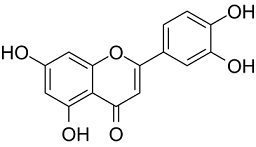
Luteolin (Luteoline) is a flavanoid that can induce cell apoptosis and cell cycle arrest in several cancer cell lines. Luteolin (Luteoline) is also a potent Nrf2 inhibitor.
Luteolin (0-160 µM; 24 hours; NCI-H460 cells) treatment inhibits the viability of NCI-H460 cells in a concentration-dependent manner.
In vivo, Luteolin (10-100 mg/kg; oral gavage; daily; for 12 weeks; adult male Wistar rats) has an antioxidant effect and can also protect against non-alcoholic steatohepatitis through targeting the pro-inflammatory IL-1 and Il-18 pathways in rats with a high carbohydrate/high fat diet.
| Molecular Weight | 286.24 |
| Formula | C15H10O6 |
| CAS Number | 491-70-3 |
| Solubility (25°C) | DMSO ≥ 90 mg/mL |
| Storage |
Powder -20°C 3 years ; 4°C 2 years In solvent -80°C 6 months ; -20°C 1 month |
| Species | Mouse | Rat | Rabbit | Guinea pig | Hamster | Dog |
| Weight (kg) | 0.02 | 0.15 | 1.8 | 0.4 | 0.08 | 10 |
| Body Surface Area (m2) | 0.007 | 0.025 | 0.15 | 0.05 | 0.02 | 0.5 |
| Km factor | 3 | 6 | 12 | 8 | 5 | 20 |
| Animal A (mg/kg) = Animal B (mg/kg) multiplied by | Animal B Km |
| Animal A Km |
For example, to modify the dose of Compound A used for a mouse (20 mg/kg) to a dose based on the BSA for a rat, multiply 20 mg/kg by the Km factor for a mouse and then divide by the Km factor for a rat. This calculation results in a rat equivalent dose for Compound A of 10 mg/kg.
[1] Fabian Gendrisch, et al. Luteolin as a modulator of skin aging and inflammation
[2] Muhammad Imran, et al. Luteolin, a flavonoid, as an anticancer agent: A review
[5] Yong Lin, et al. Luteolin, a flavonoid with potential for cancer prevention and therapy
| Related Products |
|---|
| DiosMetin 7-O-β-D-Glucuronide
DiosMetin 7-O-β-D-Glucuronide is an antioxidant constituent in the fruits of Luffa cylindrical. |
| Bendazac L-Lysine
Bendazac L-Lysine is an aldose reductase (AR) inhibitor, which can be used to inhibit the activity of AR in the eye to prevent cataracts. |
| Ro5-3335
Ro5-3335 acts as an inhibitor of core binding factor (CBF) leukemia. Ro5-3335 is a RUNX1-CBFβ interaction inhibitor that represses RUNX1/CBFB-dependent transactivation. |
| Bendazac
Bendazac is an oxyacetic acid with anti-inflammatory, antinecrotic, choleretic and antilipidaemic properties. Bendazac acts by preventing protein denaturation. |
| Dexamethasone palmitate
Dexamethasone palmitate (DXP) is a proagent of Dexamethasone. Dexamethasone palmitate can be used for the research of inflammation. |


Products are for research use only. Not for human use. We do not sell to patients.
© Copyright 2010-2023 AbMole BioScience. All Rights Reserved.
